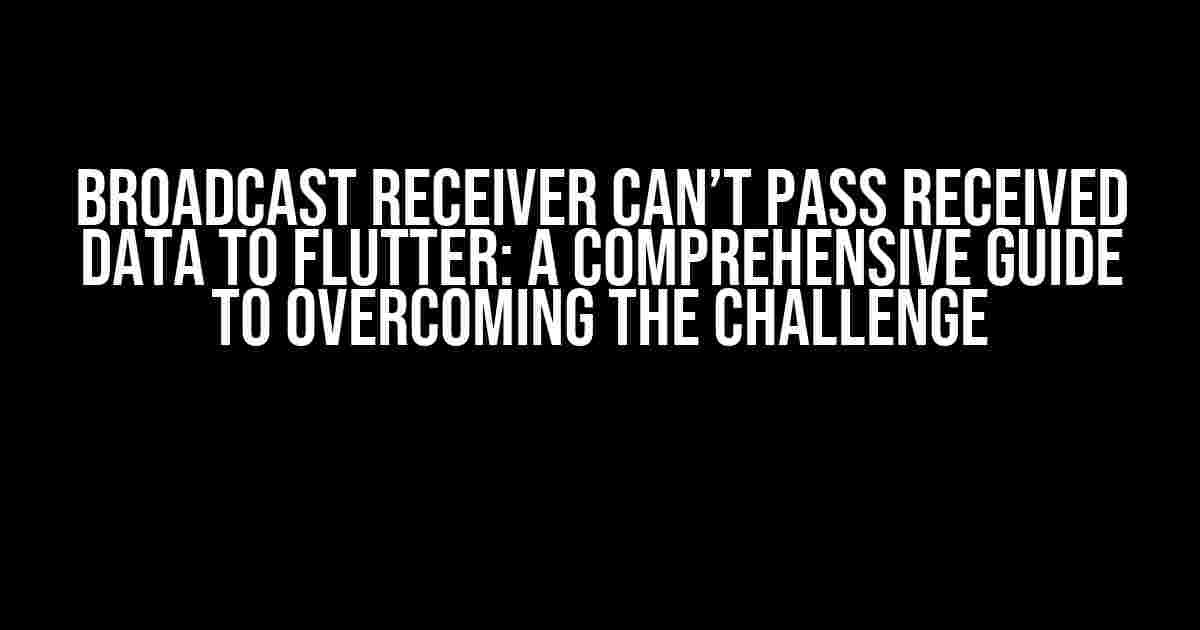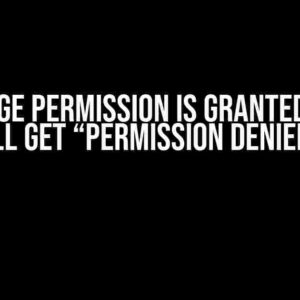If you’re a developer who’s tried to integrate a broadcast receiver with Flutter, you’ve probably encountered the frustrating issue of being unable to pass received data from the broadcast receiver to your Flutter app. Worry not, dear reader, for you’re about to embark on a journey that will equip you with the knowledge and skills to overcome this hurdle once and for all!
The Problem: Broadcast Receiver Can’t Pass Data to Flutter
The Android ecosystem is built around the concept of intents, which enable different components of an app (or even different apps) to communicate with each other. A broadcast receiver is a component that listens for specific intents and performs actions accordingly. In the context of Flutter, you might want to use a broadcast receiver to receive data from an external source and then pass it to your Flutter app.
However, when you try to do this, you’ll soon realize that the broadcast receiver can’t pass the received data to your Flutter app. This is because the broadcast receiver runs in the native Android environment, while your Flutter app runs in a separate Dart environment. The two environments don’t communicate with each other directly, making it challenging to pass data from the broadcast receiver to your Flutter app.
Understanding the Limitations of Broadcast Receivers in Flutter
Before we dive into the solution, let’s take a step back and understand why broadcast receivers can’t pass data to Flutter apps in the first place. Here are a few key limitations to keep in mind:
- Platform Channels**: Flutter uses platform channels to communicate with the native platform. However, broadcast receivers don’t have direct access to these channels, making it difficult to pass data from the receiver to the Flutter app.
- Native vs. Dart Environments**: As mentioned earlier, the broadcast receiver runs in the native Android environment, while the Flutter app runs in a separate Dart environment. This separation makes it challenging to share data between the two environments.
- Lifecycle and Scope**: Broadcast receivers have their own lifecycle and scope, which is separate from the Flutter app’s lifecycle and scope. This means that the receiver might not be able to communicate with the Flutter app when it’s needed.
Solution: Using a Platform Channel to Pass Data from Broadcast Receiver to Flutter App
Now that we understand the limitations, let’s explore a solution that involves using a platform channel to pass data from the broadcast receiver to the Flutter app. Here’s a step-by-step guide to follow:
Step 1: Create a Platform Channel
In your Flutter project, create a new file called `broadcast_receiver_channel.dart` and add the following code:
import 'package:flutter/services.dart';
class BroadcastReceiverChannel {
static const String _channelName = 'broadcast_receiver_channel';
static const MethodChannel _channel = MethodChannel(_channelName);
static Future<void> sendDataToFlutter(String data) async {
await _channel.invokeMethod('sendData', {'data': data});
}
}
This code creates a platform channel called `broadcast_receiver_channel` that will be used to communicate with the Flutter app.
Step 2: Register the Platform Channel in the Flutter App
In your Flutter app, add the following code to register the platform channel:
import 'package:flutter/material.dart';
import 'package:broadcast_receiver_channel/broadcast_receiver_channel.dart';
class MyApp extends StatefulWidget {
@override
_MyAppState createState() => _MyAppState();
}
class _MyAppState extends State<MyApp> {
@override
void didChangeDependencies() {
super.didChangeDependencies();
BroadcastReceiverChannel().init();
}
@override
Widget build(BuildContext context) {
return MaterialApp(
home: Scaffold(
appBar: AppBar(
title: Text('Broadcast Receiver Channel Demo'),
),
body: Center(
child: Text('Waiting for data from broadcast receiver...'),
),
),
);
}
}
This code registers the platform channel and initializes it when the app starts.
Step 3: Create a Broadcast Receiver and Pass Data to the Platform Channel
In your Android module, create a new file called `BroadcastReceiver.java` and add the following code:
import android.content.BroadcastReceiver;
import android.content.Context;
import android.content.Intent;
import io.flutter.plugin.common.MethodChannel;
public class BroadcastReceiver extends BroadcastReceiver {
private static final String CHANNEL_NAME = "broadcast_receiver_channel";
@Override
public void onReceive(Context context, Intent intent) {
String data = intent.getStringExtra("data");
MethodChannel channel = new MethodChannel(context.getApplicationContext(), CHANNEL_NAME);
channel.invokeMethod("sendData", data);
}
}
This code creates a broadcast receiver that listens for intents and passes the received data to the platform channel.
Step 4: Handle Data in the Flutter App
In your Flutter app, add the following code to handle the data received from the platform channel:
import 'package:flutter/services.dart';
class _MyAppState extends State<MyApp> {
String _receivedData = '';
@override
void didChangeDependencies() {
super.didChangeDependencies();
BroadcastReceiverChannel().setMethodCallHandler((call) async {
if (call.method == 'sendData') {
_receivedData = call.arguments['data'];
setState(() {});
}
});
}
@override
Widget build(BuildContext context) {
return MaterialApp(
home: Scaffold(
appBar: AppBar(
title: Text('Broadcast Receiver Channel Demo'),
),
body: Center(
child: Text('Received data: $_receivedData'),
),
),
);
}
}
This code sets up a method call handler to listen for method calls from the platform channel. When the `sendData` method is called, it updates the `_receivedData` variable and triggers a rebuild of the UI.
Conclusion
In this article, we explored the challenge of passing data from a broadcast receiver to a Flutter app and demonstrated a solution that uses a platform channel to overcome this limitation. By following these steps, you can successfully pass data from your broadcast receiver to your Flutter app and take your app to the next level!
| Keyword | Explanation |
|---|---|
| Broadcast Receiver | A component that listens for specific intents and performs actions accordingly. |
| Platform Channel | A mechanism that enables communication between the native platform and the Flutter app. |
| Native vs. Dart Environments | The native Android environment and the Dart environment are separate, making it challenging to share data between them. |
By understanding the limitations of broadcast receivers in Flutter and using a platform channel to pass data, you can unlock new possibilities for your app and provide a seamless user experience.
Additional Resources
For further reading, check out the following resources:
Happy coding, and don’t hesitate to reach out if you have any questions or need further clarification!
Frequently Asked Question
Get answers to the most common questions about broadcast receivers and Flutter!
Why can’t my broadcast receiver pass received data to Flutter?
This is likely because your broadcast receiver is running in a different context than your Flutter app. To pass data from the receiver to your Flutter app, you need to use a platform channel or a messenger service like MethodChannel or EventChannel. These channels allow you to communicate between the native platform and your Flutter app.
How do I set up a platform channel to receive data from my broadcast receiver?
To set up a platform channel, you need to create a MethodChannel or EventChannel in your Flutter app and a corresponding platform-specific implementation in your native code. In your Android broadcast receiver, use the platform channel to send the received data to your Flutter app. For example, you can use the `MethodChannel` to invoke a method in your Flutter app and pass the received data as an argument.
What is the difference between a MethodChannel and an EventChannel?
A `MethodChannel` is a platform channel that allows you to invoke a method in your Flutter app from your native code and receive a response. An `EventChannel`, on the other hand, is a platform channel that allows you to stream events from your native code to your Flutter app. If you need to receive a one-time response from your native code, use a `MethodChannel`. If you need to receive a stream of events, use an `EventChannel`.
How do I handle data serialization when passing data from my broadcast receiver to Flutter?
When passing data from your broadcast receiver to your Flutter app, you need to serialize the data into a format that can be understood by both the native platform and your Flutter app. You can use JSON or a binary format like ProtoBuf to serialize the data. Make sure to use the same serialization format in both your native code and your Flutter app to ensure that the data is correctly decoded and processed.
Can I use a third-party library to simplify the communication between my broadcast receiver and Flutter app?
Yes, there are several third-party libraries available that can simplify the communication between your broadcast receiver and Flutter app. For example, you can use a library like `flutter_android` or `android_intent` to handle the platform channel communication for you. These libraries provide a simpler API for communicating between your native code and your Flutter app, making it easier to pass data from your broadcast receiver to your Flutter app.
Hope this helps! Let us know if you have any more questions.


